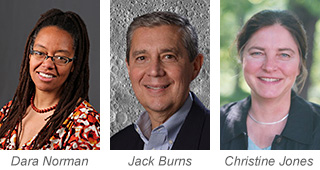AAS Ethics Task Force Invites Comments & Suggestions on Revised Ethics Code
Dara Norman NSF's NOIRLab
Dear Colleagues,
 In October 2015, the AAS president, Meg Urry, charged an AAS Ethics Task Force (ETF) with proposing changes to the current (council adopted in 2010) AAS Ethics Statement. While the original Ethics Statement covered a wide range of principles that are considered core for researchers, it was recognized by the Council that this statement contained no procedures either for reporting or handling complaints of unethical behavior. The ETF has been working on a revised AAS Code of Ethics to be proposed to the Council for adoption at the June 2016 AAS meeting.
In October 2015, the AAS president, Meg Urry, charged an AAS Ethics Task Force (ETF) with proposing changes to the current (council adopted in 2010) AAS Ethics Statement. While the original Ethics Statement covered a wide range of principles that are considered core for researchers, it was recognized by the Council that this statement contained no procedures either for reporting or handling complaints of unethical behavior. The ETF has been working on a revised AAS Code of Ethics to be proposed to the Council for adoption at the June 2016 AAS meeting.
This revision of the AAS Ethics Code is an important opportunity for our community to come together to recognize that there are some important principles to which we expect all our colleagues to adhere. The ETF also believes that a diversity of input to the Ethics Code revision will make the outcome a stronger expression of community expectations. Therefore the ETF is publicly releasing the draft version of the AAS Ethics Code revision. We invite your comments and suggestions on this draft through Monday, 4 April.
The ETF followed a few key principles in crafting the revised AAS Ethics Code.
- Membership in the AAS is a privilege not a right.
- Any AAS member or attendee at an AAS supported meeting may bring a complaint.
- The main goals of these policies and procedures are educational, corrective, and less so punitive, i.e., the AAS is interested in informing members and meeting participants about what constitutes unethical behavior in our community and how best to prevent such behavior, and is not exclusively concerned with the punishment of bad actors.
- Although the statement covers a wide range of ethical concerns, the AAS Committee on Ethics (COE) and AAS Council are often not the entity that holds expertise in the details of what constitutes a breach of ethics and may not be the body where investigation and adjudication are most appropriately done. Therefore, there are instances where the COE would defer to the institutions where those policies are outlined in greater detail and where corrective responsibility resides.
The ETF reviewed the ethics codes of several other societies, groups, and institutions. The policy and procedures in this draft version of the AAS Ethics Code were initially adopted from the ethical codes and policies of many sources, including the American Sociological Association, American Physical Society, American Institute of Physics, Association of Universities for Research in Astronomy, Harvard University’s Faculty of Arts and Sciences, the National Science Foundation, and several others (see Information and Resources in the draft Ethics Code revision for additional source material), and modified to better reflect the concerns, structure, and culture of the AAS and the astronomical community.
In addition to the proposed changes to the Ethics Statement, the task force also has a number of recommendations to Council for implementation of other policies and procedures. These recommendations are:
- Each renewing or joining member of the AAS be required to check a box on the membership form stating that they acknowledge and will abide by this ethics code as well as the AAS anti-harassment policy for meetings to the best of their ability, and they understand that any breach of the principals or standards in the code could result in sanctions including removal of member status without compensation and a revoking of prizes awarded.
- When registering for AAS and Division meetings, each registrant (including guests and exhibitors) is required to acknowledge that they have read and will abide by the AAS Code of Ethics as well as the AAS anti-harassment policy for meetings.
- The AAS Council should ask journal editors and data archival institutions to review, and if necessary, revise or update their guidelines on ethical behavior.
- The AAS should strengthen opportunities to de-escalate potential conflicts through increased education of policies to members, training of staff and volunteers (e.g., session chairs), and recommendations to astronomy stakeholders that policies regarding ethical behavior be made more clear (e.g., recommendations to archives and data centers).
- The AAS should keep an up-to-date list of resources regarding all areas of concern covered in the ethics code. This list of resources should be kept public and available for member review.
- The AAS Code of Ethics (both policy and procedures) should be reviewed regularly (possibly annually) for updates, revisions, and/or modifications.
- The AAS Council should establish a Committee on Ethics to handle complaints about breaches of the ethics code.
Please send comments to [email protected]. Emails received via this alias will only be shared with the task force members (Dara Norman, Jack Burns, and Christine Forman). Comments received by 4 April will be given full consideration by the ETF as we continue our mission of revising the AAS Ethics Code. Additionally, anonymous comments can be sent to the taskforce via an online form.
We thank you in advance for your help.
— Dara Norman, Christine Forman, and Jack Burns
AAS Ethics Task Force

